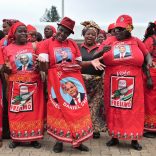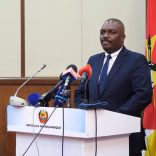Mozambique: "Fierce fight against corruption" evokes Samora Machel's objectives - Frelimo
Economist: Mozambique debt audit will only point to “scapegoats”

File photo
The Economist Intelligence Unit (EIU) today writes that the report on Mozambique’s hidden debts will ultimately only point to “scapegoats” and save the politicians involved in concealing the loans.
“If the Public Prosecutor’s Office moves forward with criminal proceedings against the individuals it considers responsible, who we suspect will be just scapegoats, before the audit is published, the government can expect to come out as going tough with corruption without criminalising the true perpetrators involved,” the report states.
In an analysis of the Kroll report on US$1.4 billion in loans backed by the state but not entered into public accounts and contracted in 2013 and 2014 by two state-owned companies, the EIU says: “this can be considered unacceptable to donors and creditors, but given that the calls for charges against powerful politicians will be left unanswered, creditors will ultimately end up accepting.”
The Mozambican government has recently confirmed that the disclosure of the report will only begin with a summary of the findings, with full disclosure of the document by the end of the first half of the year.
“A lot depends on the results of the audit, with commercial lenders refusing to formally launch negotiations for the restructuring of the three loans, which are in default, until the audit is completed,” write the experts of The Economist magazine analysis unit.
The government says that the initial summary will not disclose the names of those involved because the Attorney General’s Office is conducting an investigation running parallel to the Kroll audit. This parallel investigation made an application to have access to the bank accounts of former President Armando Guebuza and 17 other people and institutions.
“Managing the disclosure of the report is politically necessary,” Economist experts admit. “The loans have been taken over by the powerful state intelligence agency, with sovereign guarantees signed by the government, and the authorities will try to prevent any criminal guilt from being linked to influential people in the executive.”
The IMF has been holding talks with the Mozambican government about a possible resumption of financial aid through a support program, but says that first it is essential to read the audit report by the British international consultant Kroll.
At the end of March, the Attorney General’s Office announced a second month-long postponement of the report, bringing the time frame for completion to five months. Kroll failed to submit the report in February, requesting a month’s extension.
The audit focuses on loans made by Ematum, Proindicus and MAM and guaranteed by the Mozambican government in 2013 and 2014 in the amount of US$1.4 billion, plus an additional US$727.5 million of the Ematum bond issue, converted into public debt.
According to the consultant BMI Research, Mozambican public debt will this year stand at 110 percent of gross domestic product.
The discovery of the so-called hidden debts led the IMF and key international donors to suspend their aid to the country, subjecting the resumption of aid to an independent international audit.












Leave a Reply
Be the First to Comment!
You must be logged in to post a comment.
You must be logged in to post a comment.